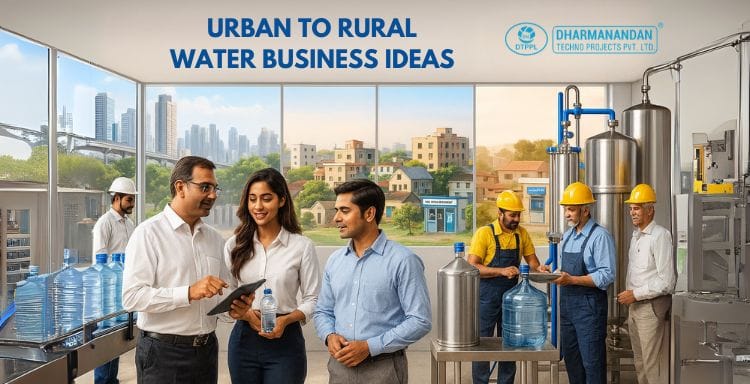
Table of Contents
Water Business Ideas in India’s Tier-1, Tier-2, and Tier-3 Cities: a Guide
July 11, 2025
In the rapidly growing market of bottled water, there’s an ever-increasing demand for clean, purified drinking water. Starting a bottled water business in India offers a lucrative opportunity, especially as the country’s demand for safe drinking water is on the rise. Whether you are considering a bottled water business plan or looking for ideas like the water can business, understanding the nuances of the water business is essential. In this article, we will answer common questions related to starting a water business, from mineral water plant costs to the best machines for bottling water in Tier-1, Tier-2, and Tier-3 cities of India.
1. What is the Water Business and How Can It Be Started?
The bottled water business involves producing and selling purified water in various packaging formats, such as bottles, jars, and pouches. This industry is driven by the need for clean drinking water in both urban and rural areas. To start a water business, it is crucial to have a clear water business plan and a reliable production system in place.
- Water Treatment Plant: The first step is setting up a water purification plant, which ensures that water is clean, safe, and drinkable. The plant will require a filtration system that includes reverse osmosis (RO), UV filtration, and other methods to ensure the water meets safety standards.
- Water Filling and Packaging Machines: The next step is investing in equipment like water bottle filling machines and water packaging machines. These machines allow you to fill bottles, jars, and pouches, which are then sealed and labeled for distribution.
- Business Licensing: You will need to obtain the necessary licenses from local authorities to start the water business, including approval for the water purification process and packaging.
- Distribution Network: Setting up a distribution network across the local area will help in reaching your target customers. Distribution could be done to retail stores, offices, schools, and households.
Pro Tip: In Tier-1 cities like Delhi and Mumbai, the demand for bottled water is high, while in Tier-2 and Tier-3 cities, the potential is greater due to the rising awareness of water quality issues.
2. What are the Different Water Business Ideas?
If you are considering entering the water business, there are several models to explore. The most common ideas include:
- Bottled Water Production: This includes both small bottles (500ml, 1L, etc.) and larger bottles (5L, 20L) of mineral water. These are the most commonly sold products in urban areas.
- Water Can Business (20L): The 20L water can business is highly profitable and has a large customer base, especially in households and offices that require bulk water.
- Water Pouch Packing: In rural areas and smaller towns, water pouches are a more affordable option for customers. Investing in a water pouch packing machine can be an efficient business model.
- Customized Water Bottles: This could be an excellent option for promotional businesses, where companies can get their logos printed on water bottles. It’s a growing trend in marketing, especially in Tier-1 and Tier-2 cities.
- Water Filter Plant: A water filter plant or filtration unit can provide customized solutions to people in different areas. If you want to expand your business, setting up a water treatment plant is a great way to contribute to local communities.
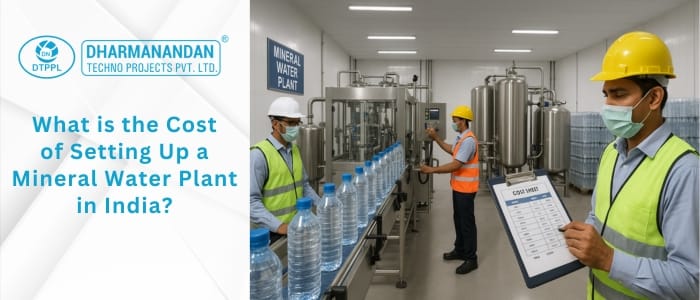
3. What is the Cost of Setting Up a Mineral Water Plant in India?
The cost of setting up a mineral water plant can vary significantly depending on factors like the scale of the operation, the location, and the specific equipment needed. Here’s an overview of what the setup typically involves:
- Land and Building: The cost of land and building can differ widely depending on the location. In Tier-1 cities like Mumbai, land prices tend to be higher, while Tier-2 and Tier-3 cities such as Jaipur or Lucknow offer more affordable options. This cost is an essential factor to consider when planning your investment.
- Water Treatment and Filtration Systems: The water purification system is crucial to ensuring the quality of the water you produce. It can include technologies such as reverse osmosis (RO), UV filtration, and microfiltration. The cost will depend on the system’s capacity, as well as the type and brand of filtration machines you choose. It’s essential to select a system that ensures your water meets national quality standards.
- Packaging Machines: To bottle and pack the water, you’ll need specialized machinery, including water bottle filling machines and packaging machines. The cost will vary based on the machine’s capacity, level of automation, and the type of bottles you plan to use. A higher capacity and automated system may require a larger upfront investment but will increase production efficiency and reduce labor costs over time.
- Raw Materials and Utilities: Other ongoing costs will include purchasing raw materials like bottles, caps, and labels, as well as utilities like electricity for running the plant. Additionally, there are labor costs and operational expenses to consider.
Given the many variables, we recommend reaching out to Dharmanandan Techno Projects Pvt. Ltd for a detailed cost estimate tailored to your specific needs. Our team can provide customized pricing for your plant setup, taking into account the size of the operation, location, and equipment preferences.
Click Here To Watch Low Budget 2000 LPH Mineral Water Plant | Small Water Plant Business
4. What Are the Different Machines Required for a Mineral Water Plant?
A successful mineral water plant requires various machines to handle the production, purification, and packaging processes. Here are the key machines you’ll need:
- Water Filtration System (RO Machine): This system ensures the water is purified to meet safety and quality standards. The filtration system plays a central role in removing impurities and contaminants, making it suitable for human consumption.
- Water Bottle Filling Machine: A filling machine is essential for bottling purified water into bottles. The filling machine ensures accuracy and speed in filling bottles without any spillage, improving efficiency.
- Water Bottle Packaging Machine: This machine helps seal and packages the water bottles for distribution. A high-quality packaging machine ensures the water is securely packed, maintaining freshness and hygiene.
- Mineral Water Bottle Packing Machine: This machine is used to pack bottles into crates or cartons, making them ready for delivery. Efficient packing machinery streamlines the final stages of production, saving time and labor.
- Water Pouch Packing Machine: This machine is ideal for markets in Tier-2 and Tier-3 cities, where smaller, more affordable packaging formats like water pouches (ranging from 200ml to 500ml) are in demand.
- Bottling Line Automation: As your production scales, automation can help manage high volumes of bottled water. Automated systems reduce the need for manual labor, increase consistency, and speed up the bottling process.
As the costs for these machines can vary, we recommend contacting Dharmanandan Techno Projects Pvt. Ltd to discuss your specific needs and get the best price for machines that suit your business.
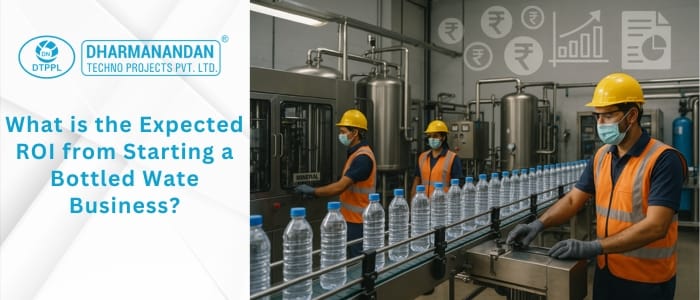
5. What is the Expected ROI from Starting a Bottled Water Business?
The return on investment (ROI) in the bottled water business is often favorable, especially in the fast-growing markets of Tier-1, Tier-2, and Tier-3 cities, where the demand for clean drinking water continues to rise. Here’s an overview of key ROI factors:
- Initial Setup Costs: Setting up a water plant, including machinery, land, water filtration systems, and infrastructure, will require a significant investment. However, the return can be rapid if you plan strategically. The capital investment will depend on the size of your plant and its location.
- Revenue Potential: In urban areas (Tier-1 cities), bottled water businesses typically experience high demand. However, Tier-2 and Tier-3 cities are seeing rapid growth as the awareness of clean drinking water increases. With the right distribution network, you can expect a solid return.
- Profit Margins: The profit margins in the bottled water business can range from 20% to 30%. Factors such as scale of production, type of packaging, and operational efficiency will determine your margins. For example, the 20L can business and water pouch business can provide higher margins due to lower packaging costs.
- Break-even Period: Most bottled water businesses break even within 1 to 2 years, depending on how quickly you scale and establish a reliable distribution network. Quality and timely delivery play a crucial role in gaining customer loyalty and ensuring steady sales.
To get a clearer idea of potential profits and ROI for your business, contact Dharmanandan Techno Projects Pvt. Ltd. We can offer insights on your expected ROI based on your plant’s configuration and market conditions.
Click Here To Watch Fully Automatic Mineral Water Plant | Water Purification Process explained
6. What Licenses and Certifications Are Required to Start a Bottled Water Business?
Starting a bottled water business in India requires obtaining several licenses and certifications to ensure the product meets regulatory standards and is safe for consumption. Here’s a breakdown of the key licenses and certifications needed:
- BIS (Bureau of Indian Standards) Certification: One of the most crucial certifications is from the Bureau of Indian Standards (BIS). BIS certifies that the water produced meets the specified standards. This certification is mandatory for manufacturing packaged drinking water and bottled water. The BIS mark, often seen on bottled water brands like Bisleri, ensures quality and safety.
- FSSAI License: The Food Safety and Standards Authority of India (FSSAI) issue a license to food businesses. Bottled water falls under the category of food products, so you must apply for an FSSAI license. The license ensures that the water you are bottling is safe for consumption.
- Pollution Control Board Clearance: If your water plant is situated in an area with significant environmental concerns, you may need approval from the Pollution Control Board to ensure that the water treatment and disposal processes are eco-friendly and comply with environmental standards.
- Health and Safety Permits: Depending on the local jurisdiction, you may need additional health and safety permits, especially for handling water and chemicals used in the purification process.
- Factory License: If you plan to set up a plant in an industrial area, you may need a factory license under the Factories Act to ensure the safety of workers and compliance with industrial regulations.
- GST Registration: Any business that has an annual turnover exceeding a certain threshold must register for Goods and Services Tax (GST). This will allow you to charge tax on your bottled water sales.
- Water Testing Certification: Regular testing of the water is essential. A certification from a recognized laboratory that confirms the water meets the required standards can help in ensuring customer trust and adherence to legal requirements.
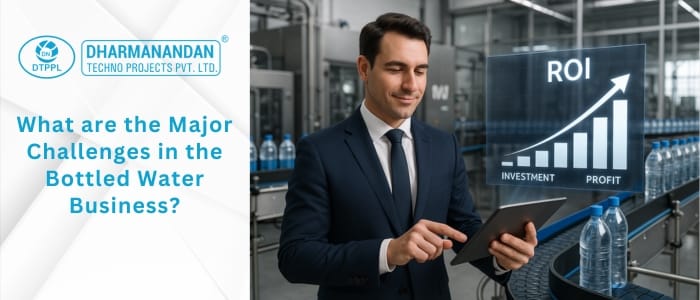
7. What are the Major Challenges in the Bottled Water Business?
Although the bottled water business offers great potential, it is not without its challenges. Being aware of these issues can help you prepare and devise solutions to mitigate them. Here are some common challenges faced by entrepreneurs in the bottled water industry:
- High Capital Investment: Setting up a mineral water plant and purchasing essential machinery like water bottle filling machines, packaging machines, and filtration units requires a significant initial investment. For small-scale businesses, managing finances can be tricky, especially if the funding is coming from loans.
- Regulatory Compliance: Navigating the regulatory landscape can be a complex process. Acquiring certifications from BIS, FSSAI, and environmental authorities takes time and effort. Failing to comply with local laws can lead to penalties or, worse, business closure.
- Competition: The bottled water market in India is highly competitive, with established brands like Bisleri, Aquafina, and Kinley dominating the market. New entrants may find it challenging to establish a brand presence without significant marketing efforts.
- Sourcing Clean Water: Water availability and quality are critical in this business. In some regions, groundwater may be contaminated, and finding a reliable, safe water source for the bottling process is a challenge.
- Distribution Network: Building a robust distribution network across cities, especially Tier-2 and Tier-3 cities can be difficult. Managing logistics, ensuring timely deliveries, and maintaining product quality during transit can pose operational challenges.
- Rising Costs: With inflation and fluctuating raw material prices (like bottles, caps, and packaging material), managing costs can become difficult. This might impact profitability, especially for smaller businesses that operate on thin margins.
8. How to Price Bottled Water to Ensure Profitability?
Pricing your bottled water effectively is crucial for success in the water business. The price must be competitive yet cover the operational costs and yield a good profit margin. Here’s how to determine the right pricing strategy:
- Cost of Production: To calculate the cost of production, you must consider several factors, such as the cost of raw water, purification system maintenance, electricity, packaging materials (bottles, caps, labels), and labor. If you’re operating a water purification plant or purchasing a mineral water machine, these will be significant expenses.
- Market Research: Study the pricing of competitors in your target market. While companies like Bisleri have established pricing, you can enter Tier-2 and Tier-3 cities with a lower price point for entry-level products (like 1-liter bottles and 20-liter cans) to capture local demand.
- Volume Pricing: Offering volume discounts can increase sales and build brand loyalty. For instance, if customers are buying in bulk (like purchasing 20-liter jars), you can offer a slight discount per unit.
- Packaging Costs: The packaging format also influences pricing. If you’re investing in a water pouch packing machine or pani bottle packing machine, consider the cost of packaging. Pouches generally have a lower cost than bottled water, which can make them more affordable for customers.
- Profit Margin: On average, the profit margin in the bottled water business ranges from 20% to 30%. However, for high-volume businesses with automated systems, this can increase. It’s important to keep the pricing competitive while ensuring that you are covering all operational expenses.
- Geography: Pricing may vary depending on the city or region. Urban markets may support higher prices due to high demand, whereas Tier-2 and Tier-3 cities might require a more affordable pricing structure.
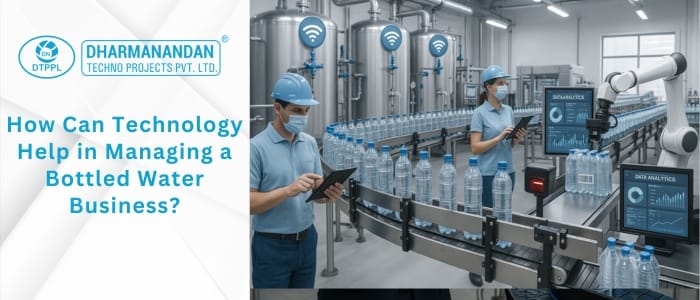
9. How Can Technology Help in Managing a Bottled Water Business?
In today’s competitive market, incorporating the latest technology in your water bottling plant can significantly enhance efficiency and productivity. Here are some ways technology can help:
- Automated Production Systems: Installing automated bottling and packaging systems can drastically reduce labor costs and improve production speed. Automated water bottle filling machines, mineral water bottling machines, and packaging machines can increase output while maintaining product consistency.
- Data Analytics: Implementing data analytics can help monitor production processes, track sales trends, and manage inventory. This can assist in forecasting demand and optimizing supply chains, ensuring that you meet customer needs without overstocking.
- Quality Control Systems: Using advanced sensors and filtration technology can help ensure that the water being bottled is of the highest quality. Water purification systems with integrated sensors can automatically detect and remove contaminants, ensuring clean and safe drinking water.
- Customer Relationship Management (CRM): Implementing CRM software can help manage customer data, orders, and feedback. This allows you to build stronger relationships with distributors, retailers, and direct consumers, which is crucial for growth.
- Online Sales Platforms: Leveraging e-commerce platforms to sell bottled water directly to consumers is an effective way to increase your market reach. Setting up an online store or partnering with delivery services can tap into the growing trend of online shopping.
10. What is the Future of the Bottled Water Business in India?
The bottled water industry in India is poised for substantial growth in the coming years. Factors contributing to this positive outlook include:
- Increasing Demand for Safe Drinking Water: As awareness of waterborne diseases grows and urbanization increases, there is an urgent need for clean, potable water. The demand for bottled water in both urban and rural areas is projected to rise.
- Health Conscious Consumers: As more people prioritize health and hygiene, bottled water is becoming the preferred choice over tap water. Additionally, the demand for premium bottled water brands is on the rise.
- Expansion of Distribution Channels: With the growth of e-commerce and the expansion of retail chains, bottled water brands will continue to gain better access to consumers, even in remote areas.
- Eco-friendly Packaging: As sustainability becomes a key consideration for consumers, companies that invest in eco-friendly packaging solutions (like biodegradable bottles or reusable containers) will likely see increased demand.
- Government Support: The government is expected to support the bottled water industry with policies aimed at ensuring access to clean drinking water and promoting local businesses. Initiatives like the Swachh Bharat Mission (Clean India Mission) also align with this goal.
Order Now, Start Your Water Business Today!
If you are ready to capitalize on the growing demand for clean drinking water and start a bottled water business in India, now is the time. With the right machinery, business plan, and strategic approach, your venture can be highly successful. Contact us to order the best mineral water plant machines and packaging equipment for your water business today. Whether you are targeting Tier-1, Tier-2, or Tier-3 cities, our state-of-the-art machines like water bottle filling machines, pani bottle packing machines, and water purification plant systems are designed to meet your business needs.
Contact Us for More Details on pricing, installation, and support. Let’s make your water business a success!
About Author

Director – Global Marketing and Sales
Mr. Bhavesh from Dharmanandan Techno Projects Pvt. Ltd. has played a pivotal role in elevating the DTPPL brand to the global stage, leveraging his exceptional expertise in marketing and communications. He is committed to helping clients achieve significant growth while strengthening their own brands. Dharmanandan Techno Projects Pvt. Ltd. is a leading manufacturer and supplier of water purification systems and turnkey solutions for mineral water plants. With years of experience in designing and delivering high-quality water treatment solutions, the company provides end-to-end services, including system design, installation, maintenance, and ongoing support. Specializing in scalable and customizable water plants, DTPPL has successfully served industries worldwide, ensuring clean and safe drinking water across diverse applications.




